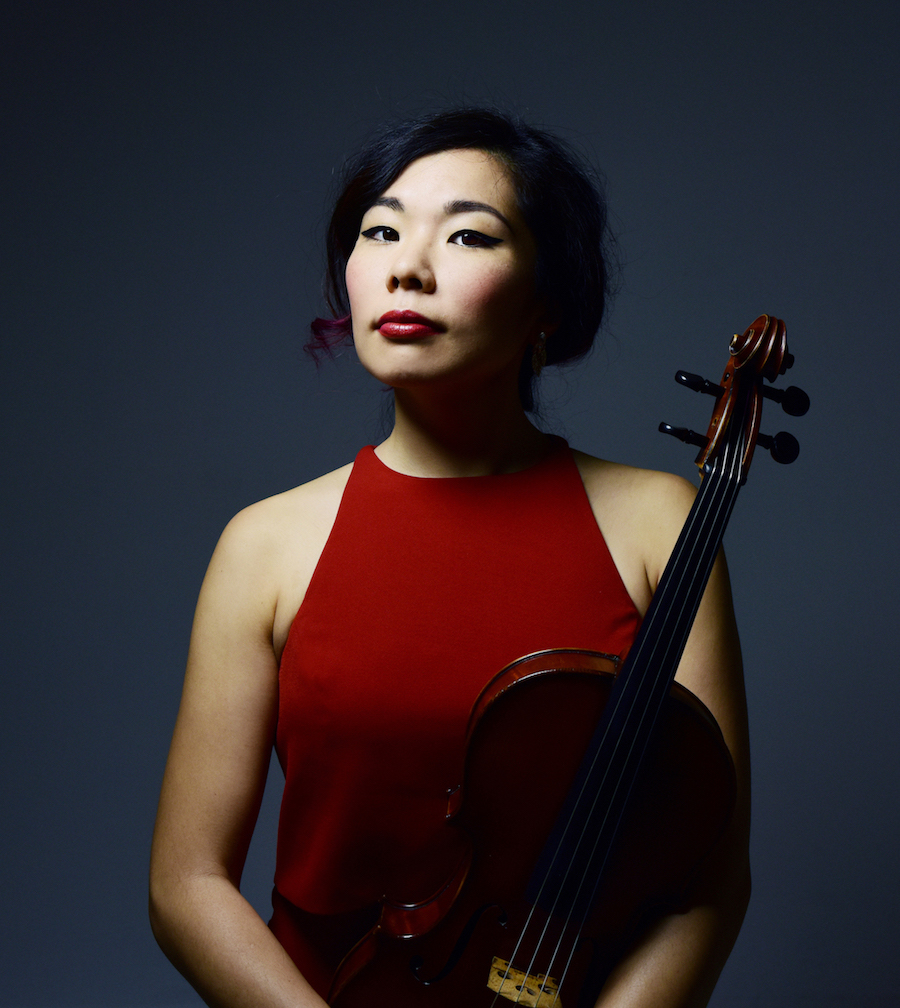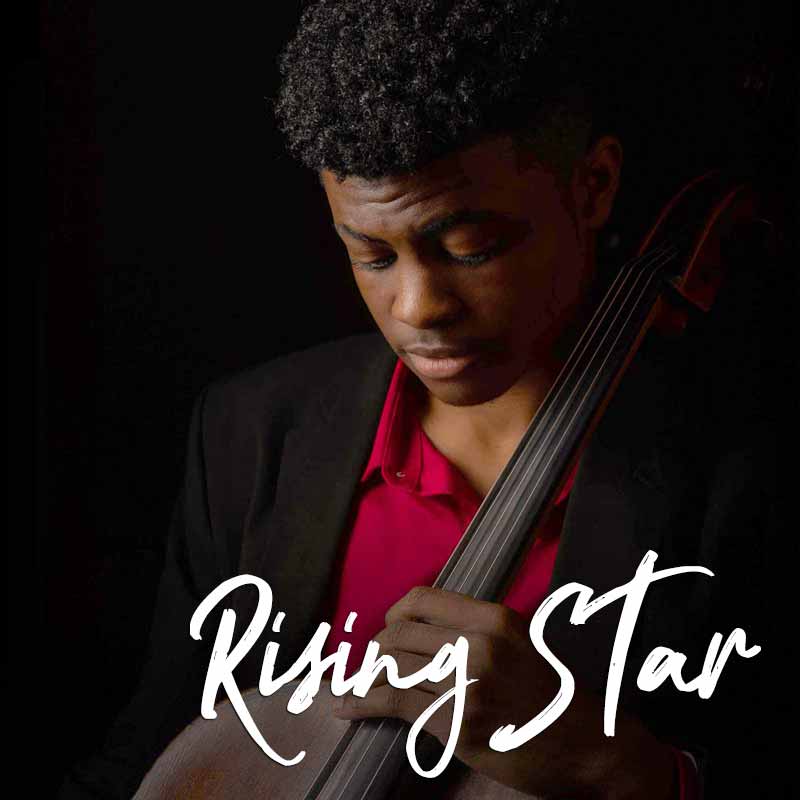by Mike Telin

In addition to three imaginative programs, the week will also welcome two Festival first-timers, violist Ayane Kozasa and cellist Sterling Elliott. Both musicians bring a wealth of chamber music experience to Cleveland and look forward to being part of the “Chamber Hood.”
Ayane Kozasa began studying the violin at age four. She pursued her undergraduate degree as a violinist at the Cleveland Institute of Music, until making the decision to become a violist. Kozasa went on to study at the Curtis Institute of Music and the Kronberg Academy in Germany. The winner of the Primrose, Astral, and Irving Klein competitions, she is a member of the award-winning Aizuri Quartet. Dedicated to expanding the viola repertoire, in 2012 she commissioned her life-partner Paul Wiancko to compose the viola/cello duo American Haiku, which was performed on this season’s ChamberFest opening concert. When not performing she enjoys pie baking, stop motion videos, and iconic movies, as well as camping and hiking.
I reached Ayane Kozasa by phone at her home in Brooklyn and began by asking her to say a few words about each of the pieces she’ll be performing this week: works by Mendelssohn, Hildegard of Bingen, and Brahms, as well as five selections from the Kronos Quartet’s 50 For the Future project.
AK: I love Mendelssohn’s B-flat major string quintet. There’s a superhero quality to it, especially during the opening. You feel like you’re soaring through the sky. The fact that it’s a viola quintet — the sound is filled out because of the extra person, which adds to the piece’s heroic quality.
I am familiar with the Kronos Quartet’s 50 For the Future project. My partner Paul was in the last group of the composers who was asked to write for them, and my quartet has played a few of these. All these pieces are wonderful, and it’s amazing to have them available to perform for free — that’s a huge thing.
Hildegard of Bingen is fascinating. She was a composer, philosopher, abbess, mystic, and a polymath. It’s incredible to find a female figure like that in the 12th century. I’m excited to dive into her O Virtus Sapiente, which is new to me. It’s important to remember that it will sound different on string instruments because we won’t be able to perform the text, so how we reimagine it without the help of text will be very interesting. There’s something about the music that hypnotises you in a wonderful way.
I was very excited when I saw that Brahms’ g-minor Piano Quartet had been programmed. It highlights each instrument in their best ways and you don’t need to worry about all of the voices being heard because Brahms was so thoughtful in the way he balanced the textures. The last movement is full of unbridled energy that explodes off of the page. It’s great to just be able to let loose, and after the long journey, to conclude with this boot-stomping fun is so satisfying.
Mike Telin: I’m curious as to why you decided to make the switch from violin to viola — I don’t want to put words in your mouth, but did you lose interest in the violin?
AK: It wasn’t a decrease of interest in the violin, but more of an increase of interest in viola. Another reason was the Intensive String Quartet Seminar with the Cavani Quartet and Peter Salaff. Each year everyone would work on the Beethoven Opus 18’s or Bartók quartets, and that sense of community was important to me. And because of that experience I realized that my calling was in the inner voices of the string quartet.
MT: At what point did you make the switch?
AK: Not until the end of my junior year. I studied with Kirsten Doctor, and she said that if I wanted to get a viola degree she would support me, but I would have to do my freshman and sophomore juries and my junior and senior recitals in one year. So I did.
What was important at the time is that I started playing the violin so early and dedicated my childhood to it, so I wasn’t aware of anything else. Then, when I got to college and tried to be an independent human being, I realized that when I decided to switch to viola, it was a conscious choice that I made by myself. And making the decision myself as an adult was important, but I had a great community of friends who were so supportive of the decision.
MT: Final question: what is your favorite camping/hiking spot?
AK: That’s the hardest question you’ve asked because I have so many. During the pandemic we went to the Catskills and that was magical — Paul and I loved it. Another place is Hidden Lake Peaks in Washington. You can’t see the lake unless you summit, but it’s an intense, beautiful hike.

I reached Sterling Elliott on his cell phone in Cleveland and began by asking him to say a few words about what he’ll be performing this week.
SE: I’ve never played Beethoven’s Magic Flute Variations, but it’s a cute and delicate piece that puts a smile on your face.
Mendelssohn’s String Quintet No. 2 is also new to me but it’s been on my bucket list forever. It’s an exciting and energetic piece that gets your blood and feet moving. And there’s an amazing cello solo in the third movement.
I’ve never played any of the 50 For the Future pieces, but we just finished the first rehearsal. I’m excited to play these, particularly the one by Tanya Tagaq. There are no specific pitches, it’s just about making sounds and it has a lot of rhythmic propulsion. It’s a ton of fun and we were just laughing the entire time.
I have not played any of Hildegard of Bingen’s music either. The first rehearsal for O Virtus Sapiente is tomorrow.
Mike Telin: What did winning the Sphinx Competition do for your confidence and your career?
SE: It was the door opener to the career that I’m building now. Because of it I’ve been able to play with some of the top orchestras in the country — Cleveland, New York Philharmonic, and I have an upcoming performance with the Los Angeles Philharmonic. Winning also led me to master classes with Yo-Yo Ma, and I got to play with Jennifer Hudson. So the Competition makes sure your talent is heard by a variety of people in a variety of places — they send you out and let you do your thing.
MT: Is it true that you began studying Suzuki cello at three years old?
SE: It is true.
MT: Can you even remember why you wanted to play the cello?
SE: Not at all. If there was a reason, it was to complete the family quartet which began with three violins. They needed a bass, so there was a cello waiting for me while I was still in the womb. So I guess you could say I was destined to play the instrument.
Apparently when I first started — and I say apparently because it’s what I’ve been told — but I guess I did find a way to snap the neck off the cello during my first week of playing it. But can you blame a three-year-old?
MT: What made you want to pursue it as a profession?
SE: When I won the Sphinx Competition — for the first time I realized what I could do with the instrument in terms of performances on the big stages.
MT: What makes you want to play the cello every day?
SE: Besides the fact that it has the best range and tone of any instrument? But I am a little biased. One thing that really puts a smile on my face is that for the past four years I’ve been playing instruments from the Juilliard collection. They’re the kind that you just take it out of the case and draw your bow and you just don’t want to stop. You make yourself late because you can’t stop playing.
One of my biggest passions is chamber music, which is why I’m so happy to be here. I can stay up till three or four in the morning playing chamber music. Which I have done quite a few times.
MT: Would you like to give a shout-out to your teacher Joel Krosnick?
SE: Yes! He’s been an amazing mentor and inspiration to me. I remember one night during my sophomore year I discovered his discography — all the chamber music and the sonatas he recorded with Gilbert Kalish. I stayed up all night listening to them and I was in awe at my next lesson.
He’s also the sort of teacher who guides you and helps you find your own voice. Because of that you can be so free with what you want to do, and he helps you do that to the best of your ability. It’s great because I’ve never felt like I’m trying to fit my playing into a box.
MT: Congratulations on all of your successes and I hope you’ll have a great week at ChamberFest.
SE: Thank you and I’m sure I will. The first day has already been amazing. Playing with such great and experienced chamber musicians can be intimidating, but once you get to the first rehearsal, everyone is always so laid-back and relaxed — it just makes the entire experience nothing but fun. And I’m having a blast.
THIS WEEK’S CHAMBERFEST CALENDAR
June 24 — Thursday — 7:00 pm – Emerging into Light — Ludwig van Beethoven’s Magic Flute Variations in E-flat for cello and piano, Bedřich Smetana’s Piano Trio in g, Op. 15, Felix Mendelssohn’s String Quintet No. 2 in B flat, Op. 87. The Grove Amphitheatre, 425 N. Commons Blvd, Mayfield. Free, but reservations required.
June 25 — Friday — 7:00 pm — Romp (Around the World) — Béla Kovács’ Shalom Aleichem, Antonín Dvořák’s Terzetto in C, Op. 74, Rolf Wallin’s Scratch for amplified balloon, Friedrich Hermann’s Capriccio No. 1 for 3 violins, Franghiz Ali-Zadeh’s RƏQS (Dance), Yotam Haber’s From The Book, Tanya Tagaq’s Sivuni Tinni, The Beatles’ Come Together, and Hawa Kasse Mady Diabate’s Tegere Tulon. The Grove Amphitheatre, 425 N. Commons Blvd, Mayfield. Free, but reservations required.
June 26 — Saturday — 7:00 pm – Festival Finale — Hildegard of Bingen’s “O Virtus Sapientiae,” Robert Schumann’s Three Romances for Clarinet and Piano, Op. 94, Sofia Gubaidulina’s String Trio and Johannes Brahms’ Piano Quartet No. 1 in g, op. 25. St. Paschal Baylon, 5384 Wilson Mills Rd., Highland Hts. All seats $50 (includes champagne toast!) and reservations required.
Published on ClevelandClassical.com June 22, 2021.
Click here for a printable copy of this article



